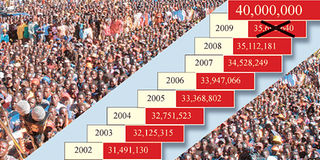Kenya’s population hits the 40m mark

Kenya population numbers and projections from the Kenya National Bureau of Statistics website. The data being collected tonight will show that projections on the website are way off the mark, with population now expected to approach 40 million
What you need to know:
- Projections show the numbers have increased by 10m since the last count
Kenya’s population is expected to approach 40 million as the national population census is conducted on Monday night.
This is a big jump of 10 million from the 28.7 million recorded 10 years ago. In 1989, there were 21.4 million Kenyans.
The figure is also markedly higher than the projection of 35.7 million for this year and 36.3 million for next year published on the official Kenya National Bureau of Statistics website.
In fact, estimates show that the population had already hit the 36 million by 2003.
This year’s count will cost Sh7.4 billion.
From this evening, 145,000 enumerators and supervisors fan out across the country visiting homesteads to establish the number of people in Kenya and also to capture other critical data.
Nairobi provincial commissioner Njoroge Ndirangu, the alternate chairman of the census organising committee, has directed that all bars be closed by 7.30pm on Monday so that patrons can join their families for the count.
As the clock ticked towards the 2009 National Population and Housing Census, the seventh since 1948, President Kibaki declared Tuesday a public holiday.
In a public address to the nation broadcast from State House, the President announced that preparations for the counting were complete and urged all Kenyans to participate.
“The time has now come for us all to be counted. The programme is on schedule. All the districts have received the materials,” the President said during the 4pm television and radio address.
The counting will start from 6pm to 10pm Monday night, which is the official census night. However, the exercise will continue from 6am to 10pm daily until August 31.
The Head of State appealed to all Kenyans to observe limited movement and stay in-doors to be counted.
“The most critical day is Monday, August 24, which is the Census night. I, therefore, call upon all Kenyans to stay at home on this material day so as to participate fully in this noble exercise,” the President said, adding that the census is central to development planning.
He also asked pastoralists who have been moving in search of water and pasture for their livestock “to make arrangements that will enable them to be counted.”
The government through various ministries has put in place strategies to distribute relief food and water to pastoralists communities during the census.
The President assured Kenyans that adequate security measures had been put in place for the census officials and the public.
“Indeed, census enumerators who will be visiting our homes have been recruited from the local neighbourhoods and will in most cases be known to the residents,” he said. The officials will further be accompanied by village and community elders as they visit households.
“They will also be wearing branded T-shirts and will be carrying identification cards,” he said.
The President said that Tuesday’s holiday is meant to further ensure security and enable enumerators to carry out most of their work within the first day of the census.
Census in Kenya was first held in 1948, when Kenya was still a British colony.
The next head count was in 1962, one year before independence, followed by 1969. Thereafter, there has been a census after every 10 years.
On Sunday, Kenya National Bureau of Statistics director Anthony Kilele said the government has released Sh2 billion to cover for a deficit in the budget and ensure Monday night’s census runs smoothly.
Police patrols
Speaking to the Nation on phone, Mr Kilele said all measures have been put in place and the enumerators are ready to start the count.
Those to be counted include households, street families, tourists, refugees visiting students. All babies born on the census night will also be counted.
Regular police patrols will be enhanced especially in potential trouble spots.
Mr Kilele said the count is conducted at night because it is the only time when most people are at home.




